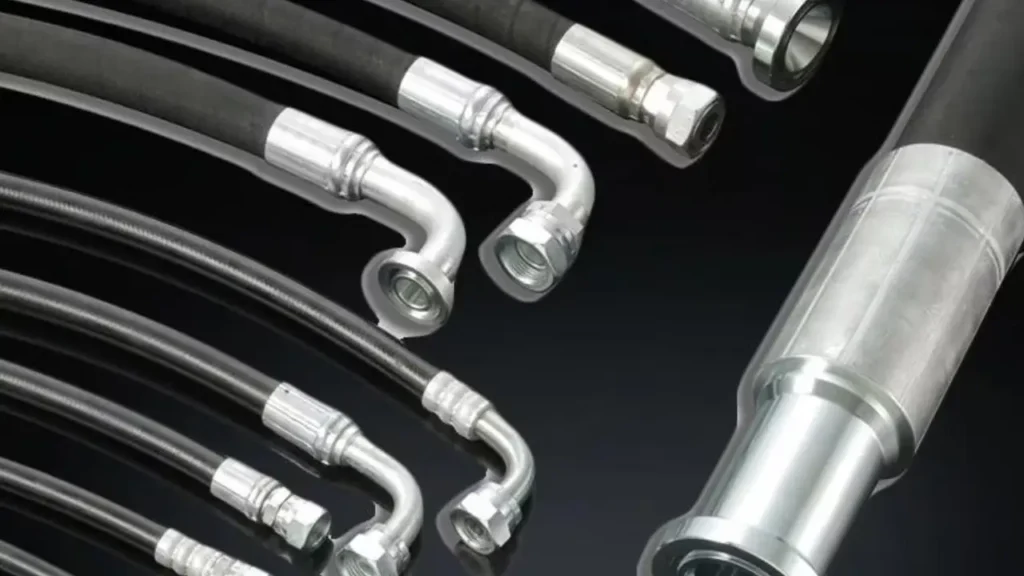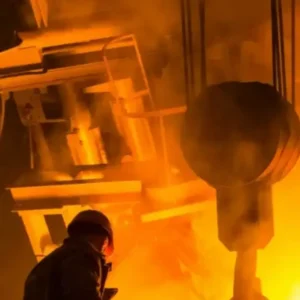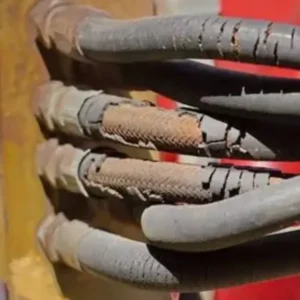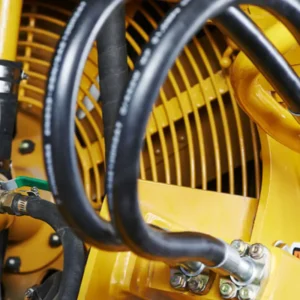Hydraulic hoses are versatile components widely used in various industries, including construction, agriculture, and manufacturing. They are designed to withstand high pressures and harsh conditions, making them suitable for transferring fluids like hydraulic oil. However, the question arises: Can hydraulic hose be used for diesel fuel?
While hydraulic hoses are durable and reliable, their suitability for fuel lines depends on several factors, including the specific hose material, the fuel type, and the operating conditions.
In this blog post, we will delve deeper into this topic, exploring the key considerations and potential risks involved in using hydraulic hose for diesel fuel lines.
Is Hydraulic Hose Rated for Diesel Fuel

While some hydraulic hoses can be used for diesel fuel applications, choosing the right type of hose is important to ensure safety and performance. Not all hydraulic hoses are compatible with diesel fuel, as the fuel can degrade certain types of rubber.
Here are some key factors to consider when choosing a hydraulic hose for diesel fuel:
Material Compatibility:
- Nitrile Rubber (NBR): A common choice for diesel fuel hoses, NBR offers good resistance to petroleum-based fluids. However, it’s essential to choose NBR hoses specifically formulated for fuel, as some general-purpose NBR blends might not be suitable.
- Fluorocarbon Rubber (FKM): Also known as Viton, FKM provides superior resistance to a wider range of fuels and additives, including diesel fuel. It’s a more expensive option but is ideal for demanding applications.
- Thermoplastics: Nylon (PA) hoses are increasingly being used for diesel applications. They offer good chemical resistance, lightweight construction, and transparency for visual inspection.
Industry Standards:
- Look for hoses that comply with industry standards such as SAE J30R (diesel fuel line) or ISO 4217 (fuel injection/transfer) to ensure compatibility and safety.
Pressure Requirements:
- The hose’s pressure rating should meet or exceed the pressure requirements of your fuel system.
Additional Considerations:
- Temperature Range: Consider the temperature range your hose will be exposed to, as it can affect the hose’s performance and lifespan.
- Chemical Compatibility: Ensure the hose is compatible with any additives or contaminants that may be present in the diesel fuel.
- Flexibility: The hose should be flexible enough to accommodate movement and vibration in the fuel system.
By carefully considering these factors, you can select the appropriate hydraulic hose for your diesel fuel application. It’s always recommended to consult with a hydraulic hose specialist or refer to the manufacturer‘s guidelines for specific recommendations.
Can Hydraulic Hose Be Used for Diesel Fuel?
It depends.
While hydraulic hoses are designed to handle high-pressure fluids, their suitability for diesel fuel applications varies based on the specific type of hose and the conditions of use.
Key factors to consider:
Material Compatibility:
- Nitrile Rubber (NBR): A common choice for diesel fuel hoses, NBR offers good resistance to petroleum-based fluids. However, it’s crucial to choose NBR hoses specifically formulated for fuel, as some general-purpose NBR blends might not be suitable.
- Fluorocarbon Rubber (FKM): Also known as Viton, FKM provides superior resistance to a wider range of fuels and additives, including diesel fuel. It’s a more expensive option but is ideal for demanding applications.
- Thermoplastics: Nylon (PA) hoses are increasingly being used for diesel applications. They offer good chemical resistance, lightweight construction, and transparency for visual inspection.
Industry Standards:
Look for hoses that comply with industry standards such as SAE J30R (diesel fuel line) or ISO 4217 (fuel injection/transfer) to ensure compatibility and safety.
Pressure Requirements:
The hose’s pressure rating should meet or exceed the pressure requirements of your fuel system.
Additional Considerations:
- Temperature Range: Consider the temperature range your hose will be exposed to, as it can affect the hose’s performance and lifespan.
- Chemical Compatibility: Ensure the hose is compatible with any additives or contaminants that may be present in the diesel fuel.
- Flexibility: The hose should be flexible enough to accommodate movement and vibration in the fuel system.
Always consult with a hydraulic hose specialist or refer to the manufacturer‘s guidelines for specific recommendations. Using the wrong type of hose can lead to leaks, failures, and potential safety hazards.
What is the Best Hose to Use for a Fuel Line
The best hose for a fuel line depends on several factors, including the type of fuel, pressure requirements, temperature exposure, and chemical compatibility. Here are some of the most common options:
For Gasoline:
- Nitrile Rubber (NBR): A common choice for gasoline, NBR offers good resistance to petroleum-based fuels. However, it’s essential to choose NBR hoses specifically formulated for fuel, as some general-purpose NBR blends might not be suitable.
- Fluorocarbon Rubber (FKM): Also known as Viton, FKM provides superior resistance to a wider range of fuels and additives, including gasoline. It’s a more expensive option but is ideal for demanding applications.
- Thermoplastics: Nylon (PA) hoses are increasingly being used for gasoline applications. They offer good chemical resistance, lightweight construction, and transparency for visual inspection.
For Diesel:
- Nitrile Rubber (NBR): Similar to gasoline, NBR hoses specifically designed for diesel fuel are a good option.
- Fluorocarbon Rubber (FKM): FKM hoses offer excellent resistance to diesel fuel and its additives.
- Thermoplastics: Nylon (PA) hoses can also be used for diesel applications, especially in low-pressure systems.
Additional Considerations:
- Industry Standards: Look for hoses that comply with industry standards such as SAE J30R (diesel fuel line) or ISO 4217 (fuel injection/transfer) to ensure compatibility and safety.
- Pressure Requirements: The hose’s pressure rating should meet or exceed the pressure requirements of your fuel system.
- Temperature Range: Consider the temperature range your hose will be exposed to, as it can affect the hose’s performance and lifespan.
- Chemical Compatibility: Ensure the hose is compatible with any additives or contaminants that may be present in the fuel.
- Flexibility: The hose should be flexible enough to accommodate movement and vibration in the fuel system.
Always consult with a hydraulic hose specialist or refer to the manufacturer‘s guidelines for specific recommendations. Using the wrong type of hose can lead to leaks, failures, and potential safety hazards.
Is a Hydraulic Hose Rated for Gasoline
No, a standard hydraulic hose is not rated for gasoline.
While hydraulic hoses are designed to handle high-pressure fluids, they are not specifically designed to withstand the chemical properties of gasoline. Using a standard hydraulic hose for a gasoline line can lead to:
- Hose Deterioration: The chemicals in gasoline can degrade the rubber compounds used in hydraulic hoses, leading to cracks, leaks, and potential fires.
- Fuel Leaks: The pressure and vibration associated with fuel lines can exacerbate the deterioration process, increasing the risk of fuel leaks.
- Safety Hazards: Fuel leaks can pose serious safety risks, including fires and explosions.
To ensure safety and reliability, it’s crucial to use a fuel-resistant hose specifically designed for gasoline applications. These hoses are made from materials that are resistant to the chemicals in gasoline and are designed to handle the specific pressures and temperatures associated with fuel systems.
When selecting a fuel hose, consider the following factors:
- Material Compatibility: Choose a hose made from materials that are resistant to gasoline, such as NBR (Nitrile Rubber) or FKM (Fluorocarbon Rubber).
- Pressure Rating: Ensure the hose’s pressure rating is sufficient for your application.
- Temperature Range: Consider the temperature extremes the hose will be exposed to.
- Industry Standards: Adhere to industry standards like SAE J30R7 or SAE J30R9 for fuel line hoses.
By selecting the right fuel hose, you can ensure the safety and reliability of your fuel system.
Conclusion
While hydraulic hoses are engineered for high-pressure fluid transfer, their suitability for diesel fuel applications requires careful consideration. Factors like fuel additives, temperature fluctuations, and potential chemical reactions can impact hose performance and longevity.
It’s crucial to consult with a hydraulic hose specialist or refer to manufacturer guidelines to ensure compatibility and safety. Using the wrong hose type can lead to leaks, failures, and severe consequences.
Ready to upgrade your hydraulic hose system? Contact us today to explore our wide range of high-quality hydraulic hoses, designed to meet the demands of various industrial applications. Get your hydraulic hoses wholesale now and experience the difference.




